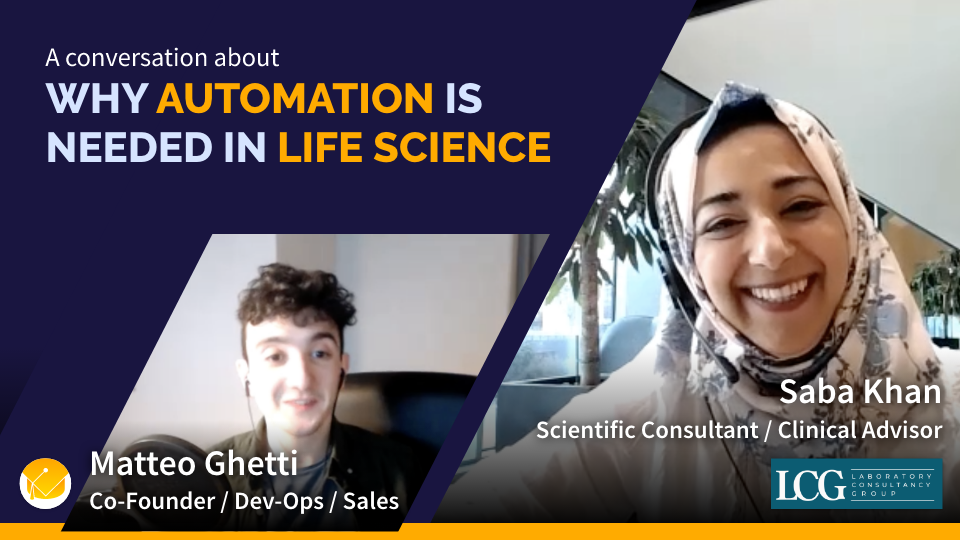Why Automation is needed in Life Science - A conversation with Saba Khan..
Saba Khans goal is to help scientists with their processes. After seeing scientists struggling in their laboratories Saba set up her own company, with a team of experts who travel to labs and offer expert advice on how to set up laboratories with the focus of making them automation friendly.

The Tiger Team Lab Consultancy Group is a new venture. It is aimed towards helping scientists with their processes. Saba Khan has traveled to a lot of laboratories and seen how scientists struggle. So she decided to set up her own company, with a team of experts who can travel to labs and offer expert advice on how to set up laboratories, how to review the manual processes, and how to convert them into automation and make labs automation friendly.
– I see a lot of scientists who are struggling in their laboratories with a protocol or an essay, and I think, if you just had a little bit of advice. Scientists often get a tunnel vision, so sometimes it can be good to have an impartial objective observer to come in and observe your processes in order to give you that advice.
It's two different worlds. You've got the scientific world and then you've got the engineering world, right? So there's a lot of things that just don't translate across, or it's not really evident in the automation or it is just missed.
You mentioned that you would like to help the scientists towards more automation because you have seen that they experience some troubles or some difficulties. In your travels, what are the main issues?
– It's two different worlds. You've got the scientific world and then you've got the engineering world, right? So there's a lot of things that just don't translate across, or it's not really evident in the automation or it is just missed. These things can be very critical to their essay. And I always ask my clients, what is your vision of success? What does success look like for you?
– Then I look at their protocols, and make sure that it's fully translated and incorporated into their automated platform. There's a lot of times where things are missed off. For example their reagents might be very light sensitive, they might be sensitive to PH or changes in temperature, and those type of factors are sometimes missed and not fully factored in when the automation is built.
– And that would really affect the quality of their results. So those are the type of things that I work out with the customer.
It is not like a one size fits all kind of scenario.
– No, no. Every customer is different, right? Every client is doing their own research. What their research is about is very unique to their laboratory. Understanding what their research aims are, and then actually implementing that and making sure it's fully translated into the automation. And sort of going through their results and understanding what their results look like to make sure that they can achieve that with an automated workflow.
I can imagine that as soon as you mention automation, it's not that everyone would like a cheer and go for it. So what are the main resistances that you or objections that you have encountered?
– Most people are for automation. The only people that I've met that were hesitant towards automation were slightly risk averse. They probably came from a quality background and were concerned with things like sample tracking. Especially with clinical samples, the clients want to make sure that they can track a sample from start to finish and that they know the sample that they're putting into an automated platform actually matches up with the patient ID. So things to do with sample tracking is one of the concerns that clients normally have and they can be quite risk averse and a bit resistant to moving to automation.
– Another factor that some clients have that make them a little bit averse to automation is liquid handling. There's always the risk of contamination. You have to prove that you don't get any cross-contamination with liquid handlers, and that can be a source of concern because one of the main purposes of lab automation can be high throughput.
Quite often you need an expert in that field to help you plan your experiments and design your experiments so you can track a sample from start to finish.
– They have to prove that the sample tracking and that the liquid handling is working exactly as they expect it to do. And that's actually a large body of work. It can be sometimes quite tedious and especially if you're quite new to automation. It's a difficult process. Quite often you need an expert in that field to help you plan your experiments and design your experiments so you can track a sample from start to finish.
And then now a related question, because you mentioned at the beginning that the automation in clinical research and in clinical science involves both a scientific soul and an engineering soul. Of course it is hard to have everything in one position. One person that can handle everything. So how do you handle this problem?
– This is where you need a team of experts who have skill sets in all of these fields. You need someone who is an expert in understanding the science and the scientific processes. And then you also need someone who is an engineer who understands the automation and the liquid handling. You a need liquid handling expert and then you also need someone who understands the quality assurance aspect. Then you also need someone from a health and safety background to make sure that they know if the samples are a biological hazard, for example, should they be handled a category two level? Does that need to be handled at a Category three level? So this all comes down to the levels of containment and how that sample should be handled and stored. You kind of need a team of experts, and that's what we're building. The Tiger Team Lab Consultancy Group, a team of dedicated experts who know each of these fields very, very well, so they can guide the client through to make sure that they're really getting the most out of their automated platform.
For a scientist, you need to have that data. So when a client approaches me and they have a research project and they need some support with that, then the first thing I would do is sit down with them and then actually do a literature search.
So you're basically getting one expert of each in a sense? So you can map it to your customers and have the best mix for the customers. How can the current literature help you as a team of consultants in different sectors and of course your customer. How important is current literature?
– I think having access to the most current of today, scientific and clinical research data is absolutely imperative. For a scientist, you need to have that data. So when a client approaches me and they have a research project and they need some support with that, then the first thing I would do is sit down with them and then actually do a literature search.
– I would then look at what their project is about and really understand it before providing that advice. So having access to that literature is really, really important. And quite often, you know, scientists are in labs and they're busy doing their laboratory experiments so they don't really have time to necessarily see what the latest literature is out there.
– So by having access to something like PapersHive, which I think is an excellent source of literature and a really easy way to get to the most current and the most relevant piece of information as well. It really helps the client because you're then able to give them the advice that they were looking for that they need in order to get the next set of data and to make progress on their project.
What are your main suggestions or tips if, for example, there is a scientist out there that is looking for automation or the opposite, perhaps, let's say a tech person, a tech soul that is actually looking for helping life science. What is your best tip?
– I think it is to network. Definitely to network and to meet lots of people, because you will come across people with lots of different skill sets and you might not necessarily have come across them in your workplace. So I think attending networking events, whether it's a live science networking event or whether it's a health tech or any kind of sort of networking event, I think is really, really important because then you meet people with different backgrounds or skill sets, you might be working on a project and realize that, actually that person would be really useful for me here.
– And just having an online profile and, a method for people to contact you, I think it's really important now and I think sort of post-pandemic, we've now all moved to online. So I think it's really, really important now. You know, people are online a lot more and it's easier to help a lab that's in a different country now. So it's easier to be collaborative. So I think having an online platform and having your details, your profile and a method for people to contact you online is really important

Everything starts with search.
With a smart suite of search tools to help you find the information you need, when you need it. Enhance your Search Experience with PapersHive Today!
Contact Us